
"Where the Streets Have No Name" is a song by Irish rock band U2. It is the opening track from their 1987 album The Joshua Tree and was released as the album's third single in August 1987. The song's hook is a repeating guitar arpeggio using a delay effect, played during the song's introduction and again at the end. Lead vocalist Bono wrote the lyrics in response to the notion that it is possible to identify a person's religion and income based on the street on which they lived, particularly in Belfast. During the band's difficulties recording the song, producer Brian Eno considered erasing the song's tapes to have them start from scratch.

"New Year's Day" is a song by Irish rock band U2. It is the third track on their 1983 album War and was released as the album's lead single in January 1983. With lyrics written about the Polish Solidarity movement, "New Year's Day" is driven by Adam Clayton's distinctive bassline and the Edge's piano and guitar playing. It was the band's first UK hit single, peaking at number 10, and was also their first international hit, reaching for number 9 in Norway, number 11 on the Dutch Top 40, number 17 in Sweden, and number 53 on the Billboard Hot 100 in the United States, becoming the band's first single to chart in the US.

"I Will Follow" is a song by rock band U2. It is the opening track from their debut album, Boy, and it was released as the album's second single in October 1980. Lead singer Bono wrote the lyrics to "I Will Follow" in tribute to his mother, who died when he was 14 years old.

"With or Without You" is a song by Irish rock band U2. It is the third track on their fifth studio album, The Joshua Tree (1987), and was released as the album's lead single on 16 March 1987. The song was the group's most successful single at the time, becoming their first number-one hit in both the United States and Canada by topping the Billboard Hot 100 for three weeks and the RPM national singles chart for one week, with a further three weeks at number two.

"I Still Haven't Found What I'm Looking For" is a song by Irish rock band U2. It is the second track from their 1987 album The Joshua Tree and was released as the album's second single in May 1987. The song was a hit, becoming the band's second consecutive number-one single on the US Billboard Hot 100 while peaking at number six on the UK Singles Chart.
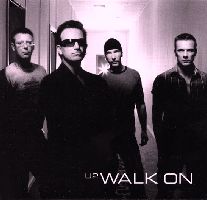
"Walk On" is a song by Irish rock band U2. It is the fourth track on their tenth studio album, All That You Can't Leave Behind (2000). The song was first released in Canada on 20 February 2001, then was given a UK release in November of the same year; it was the album's second single in Canada and the fourth internationally. The song was written about Burmese academic Aung San Suu Kyi, who was the chairperson of the National League for Democracy and was placed under house arrest from 1989 until 2010 for her pro-democracy activities, which led to the song being banned in Burma. In 2002, the song won the Grammy Award for Record of the Year at the 44th Annual Grammy Awards ceremony, marking the first time an artist had won the award for songs from the same album in consecutive years.

"If God Will Send His Angels" is a song by Irish rock band U2. It is the fourth track on their 1997 album, Pop, and was released as its fifth single on 8 December 1997. It was also featured on the City of Angels soundtrack.
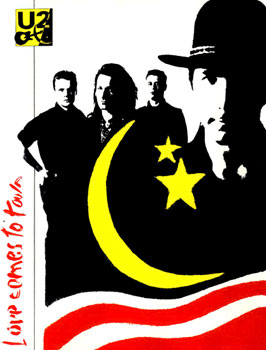
The Lovetown Tour was a concert tour by the Irish rock band U2, which took place in late 1989 and early 1990 following the release of Rattle and Hum. It was documented by noted rock film director Richard Lowenstein in the "LoveTown" documentary.
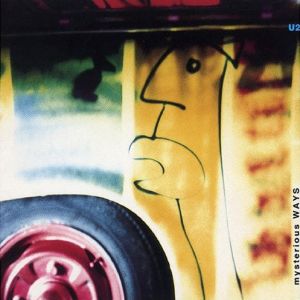
"Mysterious Ways" is a song by Irish rock band U2. It is the eighth track from their 1991 album, Achtung Baby, and was released as the album's second single on 2 December 1991. The song began as an improvisation called "Sick Puppy", with the band liking only the bass part that bassist Adam Clayton composed. The band struggled to build a song from it, with vocalist Bono and producer Daniel Lanois arguing intensely during one songwriting session. The song's breakthrough came after guitarist the Edge began experimenting with the Korg A3 effects unit. "Mysterious Ways" features a danceable beat, funky guitar hook, and conga-laden percussion, as well as mystical lyrics by Bono about romance and women.

"The Fly" is a song by Irish rock band U2. It is the seventh track from their 1991 album, Achtung Baby, and it was released as the album's first single on 21 October 1991. "The Fly" introduced a more abrasive-sounding U2, as the song featured danceable hip-hop beats, industrial textures, distorted vocals, and an elaborate guitar solo. Lead vocalist Bono described the song as "the sound of four men chopping down The Joshua Tree", due to its departure from the sound that had traditionally characterised the band in the 1980s.
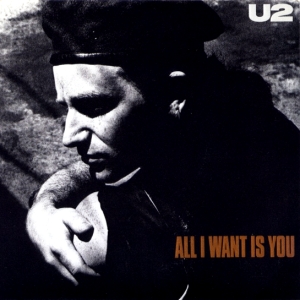
"All I Want Is You" is a song by Irish rock band U2. It is the final track on their 1988 album, Rattle and Hum, and was released as its fourth and final single on 12 June 1989. It also appears in the Rattle and Hum film, playing over the closing credits.

"Angel of Harlem" is a song by Irish rock band U2. It is the tenth track on their 1988 album Rattle and Hum, and was released as its second single in December 1988. It topped the charts in Canada and New Zealand, and peaked at number nine on the UK Singles Chart, number eight on the Dutch Top 40, number 14 on the Billboard Hot 100, and number one on the Mainstream Rock Tracks chart. Written as a homage to Billie Holiday, it was released with two different B-sides; one was an original U2 song called "A Room at the Heartbreak Hotel," while the other was a live version of Rattle and Hum's "Love Rescue Me".

"Desire" is a song by Irish rock band U2 and the third track on their 1988 album, Rattle and Hum. It was released as the album's lead single on 19 September 1988, and became the band's first number-one single in the United Kingdom and Australia. It reached number three on the Billboard Hot 100 in the United States, and topped both the Modern Rock Tracks and Mainstream Rock Tracks charts, making it the first song to reach number one on both charts simultaneously. It reached number two on the Dutch Top 40. At the 31st Annual Grammy Awards, "Desire" won the 1988 Grammy Award for Best Rock Performance by a Duo or Group with Vocal.
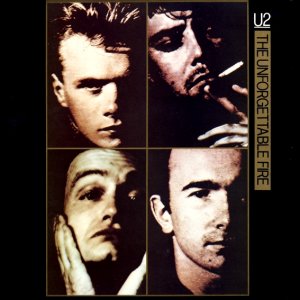
"The Unforgettable Fire" is a song by Irish rock band U2. It is the title track of their fourth album (1984), and was released as the album's second single in April 1985. The band cited an art exhibition by victims of the atomic bombings of Hiroshima and Nagasaki that was held at The Peace Museum in Chicago as the lyrical inspiration for the song. It became U2's first number one single in Ireland, their third top-ten hit in the United Kingdom, reaching number six on the UK Singles Chart, and reached number eight on the Dutch singles chart.

"Pride (In the Name of Love)" is a song by Irish rock band U2. It is the second track on the band's 1984 album, The Unforgettable Fire, and was released as its lead single in September 1984. The song was produced by Brian Eno and Daniel Lanois. Written about the American civil rights leader Martin Luther King Jr., "Pride" received mixed critical reviews at the time, but it was a major commercial success for U2 and has since become one of their most popular songs, as well as been re-evaluated positively by many as one of the greatest songs of all time. It appeared on the band's compilation albums The Best of 1980–1990 and U218 Singles and was reworked and re-recorded for Songs of Surrender (2023).

"Two Hearts Beat as One" is a song by Irish rock band U2. It is the seventh track on their 1983 album, War, and was released as its second single in the United States, United Kingdom, and Australia on 21 March 1983.
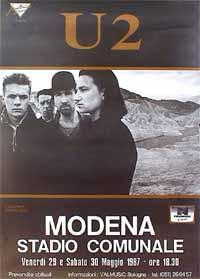
The Joshua Tree Tour was a concert tour by Irish rock band U2. Staged in support of their 1987 album The Joshua Tree, the tour visited arenas and stadiums across North America and Europe from April to December 1987. The tour was depicted on the video and live album Live from Paris, and on the 1988 album and documentary film Rattle and Hum.
"God Part II" is a song by rock band U2, and the 14th track from their 1988 album Rattle and Hum.
"Out of Control" is a song by Irish rock band U2. It was the A-side of the group's debut release, the EP Three. It was released in September 1979 and charted at number 19 on the Irish Singles Chart. A re-recorded version of the song was included on the band's debut album, Boy, in 1980. The song was reinterpreted in an acoustic arrangement for the band's 2023 album Songs of Surrender.

The U2 360° Tour was a worldwide concert tour by rock band U2. Staged in support of the group's 2009 album No Line on the Horizon, the tour visited stadiums from 2009 through 2011. The concerts featured the band playing "in the round" on a circular stage, allowing the audience to surround them on all sides. To accommodate the stage configuration, a large four-legged structure nicknamed "The Claw" was built above the stage, with the sound system and a cylindrical, expanding video screen on top of it. At 164 feet (50 m) tall, it was the largest stage ever constructed. U2 claimed that the tour would be "the first time a band has toured in stadiums with such a unique and original structure."


















